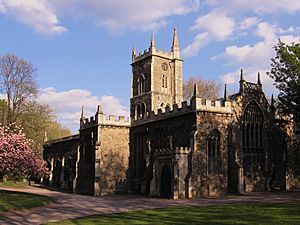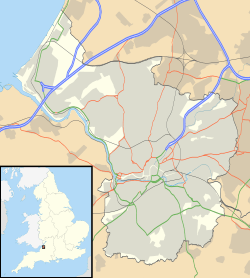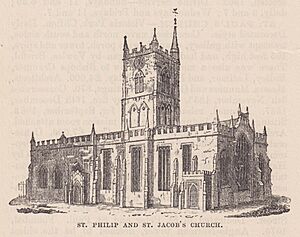St Philip and St Jacob, Bristol facts for kids
Quick facts for kids Church of St Philip and St Jacob |
|
|---|---|
| Central | |
 |
|
| 51°27′18″N 2°35′06″W / 51.454969°N 2.584987°W | |
| Location | Bristol |
| Country | England |
| Denomination | Church of England |
| Churchmanship | Charismatic Evangelical |
| History | |
| Status | Active |
| Architecture | |
| Functional status | Parish church |
| Heritage designation | Grade II* listed |
| Designated | 8 January 1959 |
| Architect(s) | Robert, 1st Earl of Gloucester |
| Architectural type | Early English, Perpendicular |
| Groundbreaking | Circa 900AD |
| Completed | Before 1174 |
| Administration | |
| Parish | St Philip and St Jacob with Emmanuel Bristol |
| Deanery | City |
| Archdeaconry | Archdeaconry of Bristol |
| Diocese | Diocese of Bristol |
The SS Philip and Jacob Church is a historic church in central Bristol, England. It is also known as Pip 'n' Jay. The church group that meets there today is called Central Church, Bristol. Its full name since 1934 is St Philip and St Jacob with Emmanuel the Unity. Records show that a church dedicated to St Philip existed here as early as 1174. This church has been called the 'Mother church of East Bristol'. It serves the area known as The Dings.
Contents
The Church Building: A Look Inside
St Philip and St Jacob is thought to be Bristol's oldest place for Christian worship. The church started as a small priory, which is a type of monastery, around AD 900. It was later rebuilt by Robert, 1st Earl of Gloucester. He was an important person who also built the nearby St James' Priory.
What Remains of the Old Church?
Today, the only part left from the very first church is the baptismal font. This is a special basin used for baptisms. Some parts of the chancel (the area around the altar) and the tower are from at least the 13th Century. The building was made bigger during the Middle Ages to include the main area called the nave. The large pillars in the nave were added later, during the Victorian era. They were possibly designed by William Armstrong.
The Church Bells
The church tower holds eight bells. These bells were made in 1738 by William Bilbie, who came from the famous Bilbie family of bell makers.
Later Additions and Changes
Around 1860, new plans were made to rebuild parts of the church. These plans were created by architects John Bindon, Richard Shackleton Pope, and Thomas Shackleton Pope. In the 1980s, an extension was added to the south-east side of the church. This part includes meeting rooms, a kitchen, and other useful facilities. The building is a Grade II* listed structure, which means it is a very important historic building.
Church History: Times of Trouble
The Church of St Philip and St Jacob has faced challenges over the centuries.
Surviving the English Civil War
During the English Civil War, there was an order to knock down the church. This was to stop it from being used as a fort to attack the city of Bristol. Luckily, more soldiers arrived in the city, and the church was saved from being destroyed.
Avoiding Closure in the 1960s
In the early 1960s, the church was almost closed down again. It even faced the possibility of becoming a potato factory! However, the small group of church members, called the congregation, were very determined. They saved the church by adopting the motto 'Seek First' and the special nickname 'Pip 'n' Jay'.
The Church Today: A Lively Community
Since 1963, St Philip and St Jacob has grown to be one of the most important Evangelical churches in Bristol.
The Charismatic Revival
In the 1970s, it became part of the Charismatic revival within the Church of England. This was a time when many churches experienced a new focus on spiritual gifts and worship.
Past and Present Leaders
The vicar from 1974 until 2009 was the Revd Canon Malcolm Widdecombe. He was the brother of the famous politician Ann Widdecombe. Today, the church helps and sends out many missionaries to share their faith. In 2018, the church changed its name to Central Church. The current Vicar, the Revd Tim Jones, started his role in 2023.
The Parish: A Community Area
St Philip and St Jacob is one of Bristol's original church areas, known as parishes.
What the Parish Includes
The parish covers the Old Market area. It also used to stretch beyond the old city limits. This included areas that are now Bristol districts like Baptist Mills, Barton Hill, Lawrence Hill, Newtown, Russell Town, St Jude's, St Philips Marsh, The Dings, and part of Easton.
Growth and New Churches
In the 1800s, the population grew a lot. This led to ten new churches being built in the eastern part of the parish. Seven of these churches have now closed. In 1871, Greenbank Cemetery was opened. It served as a burial place for the entire parish.
See also
- Grade II* listed buildings in Bristol
- Churches in Bristol
 | George Robert Carruthers |
 | Patricia Bath |
 | Jan Ernst Matzeliger |
 | Alexander Miles |



